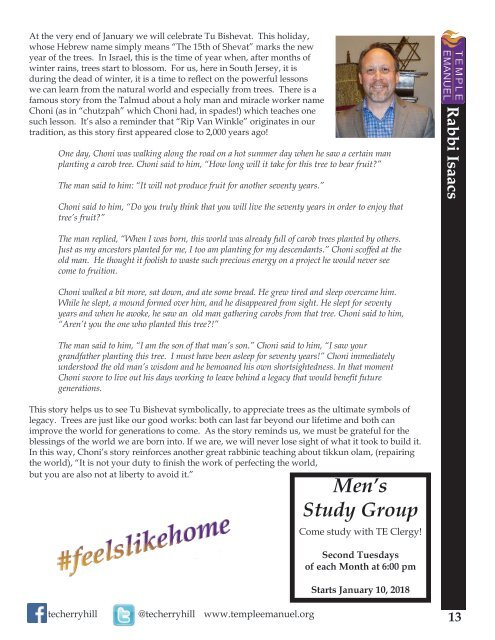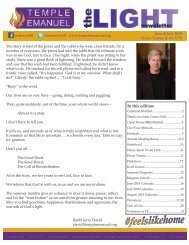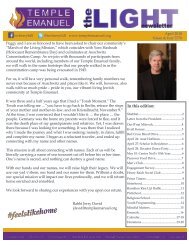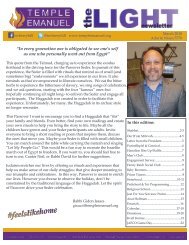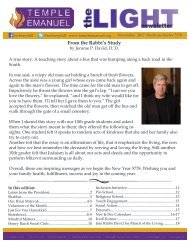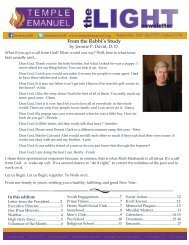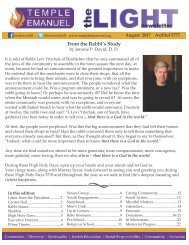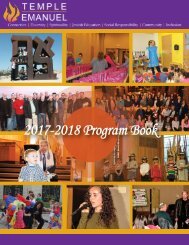December 2017 January 2018 Light
You also want an ePaper? Increase the reach of your titles
YUMPU automatically turns print PDFs into web optimized ePapers that Google loves.
At the very end of <strong>January</strong> we will celebrate Tu Bishevat. This holiday,<br />
whose Hebrew name simply means “The 15th of Shevat” marks the new<br />
year of the trees. In Israel, this is the time of year when, after months of<br />
winter rains, trees start to blossom. For us, here in South Jersey, it is<br />
during the dead of winter, it is a time to reflect on the powerful lessons<br />
we can learn from the natural world and especially from trees. There is a<br />
famous story from the Talmud about a holy man and miracle worker name<br />
Choni (as in “chutzpah” which Choni had, in spades!) which teaches one<br />
such lesson. It’s also a reminder that “Rip Van Winkle” originates in our<br />
tradition, as this story first appeared close to 2,000 years ago!<br />
One day, Choni was walking along the road on a hot summer day when he saw a certain man<br />
planting a carob tree. Choni said to him, “How long will it take for this tree to bear fruit?”<br />
The man said to him: “It will not produce fruit for another seventy years.”<br />
Choni said to him, “Do you truly think that you will live the seventy years in order to enjoy that<br />
tree’s fruit?”<br />
Rabbi Isaacs<br />
The man replied, “When I was born, this world was already full of carob trees planted by others.<br />
Just as my ancestors planted for me, I too am planting for my descendants.” Choni scoffed at the<br />
old man. He thought it foolish to waste such precious energy on a project he would never see<br />
come to fruition.<br />
Choni walked a bit more, sat down, and ate some bread. He grew tired and sleep overcame him.<br />
While he slept, a mound formed over him, and he disappeared from sight. He slept for seventy<br />
years and when he awoke, he saw an old man gathering carobs from that tree. Choni said to him,<br />
“Aren’t you the one who planted this tree?!”<br />
The man said to him, “I am the son of that man’s son.” Choni said to him, “I saw your<br />
grandfather planting this tree. I must have been asleep for seventy years!” Choni immediately<br />
understood the old man’s wisdom and he bemoaned his own shortsightedness. In that moment<br />
Choni swore to live out his days working to leave behind a legacy that would benefit future<br />
generations.<br />
This story helps us to see Tu Bishevat symbolically, to appreciate trees as the ultimate symbols of<br />
legacy. Trees are just like our good works: both can last far beyond our lifetime and both can<br />
improve the world for generations to come. As the story reminds us, we must be grateful for the<br />
blessings of the world we are born into. If we are, we will never lose sight of what it took to build it.<br />
In this way, Choni’s story reinforces another great rabbinic teaching about tikkun olam, (repairing<br />
the world), “It is not your duty to finish the work of perfecting the world,<br />
but you are also not at liberty to avoid it.”<br />
Men’s<br />
Study Group<br />
Come study with TE Clergy!<br />
Second Tuesdays<br />
of each Month at 6:00 pm<br />
Starts <strong>January</strong> 10, <strong>2018</strong><br />
techerryhill<br />
@techerryhill www.templeemanuel.org<br />
13


